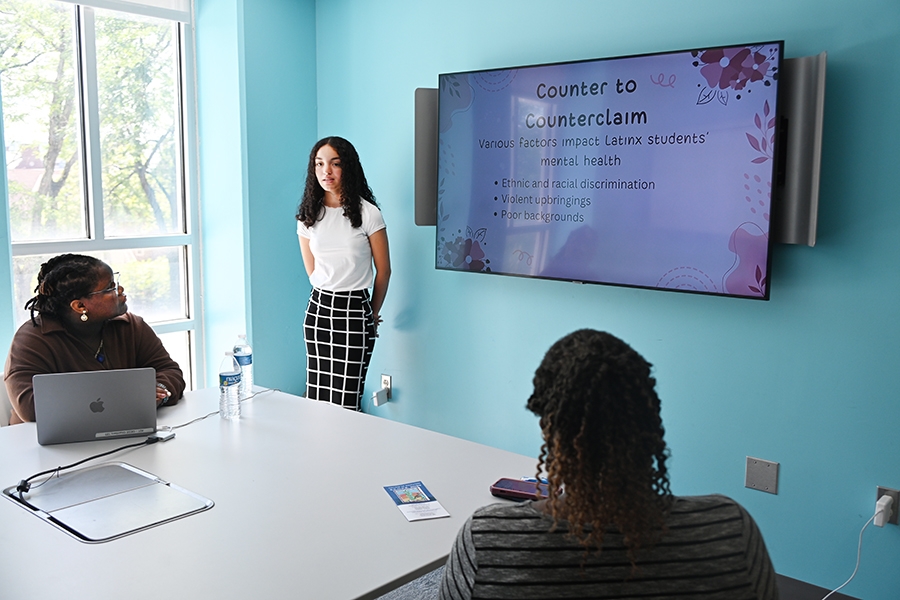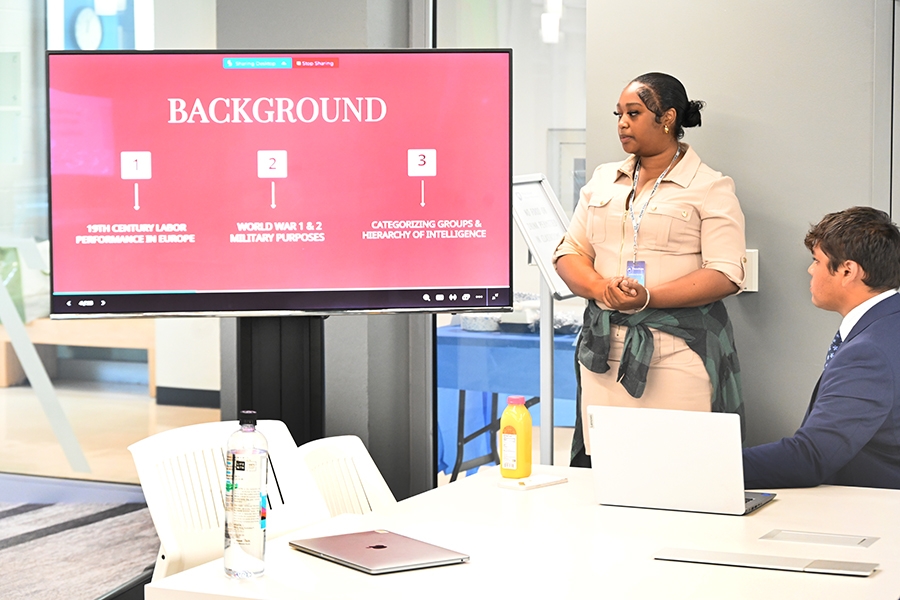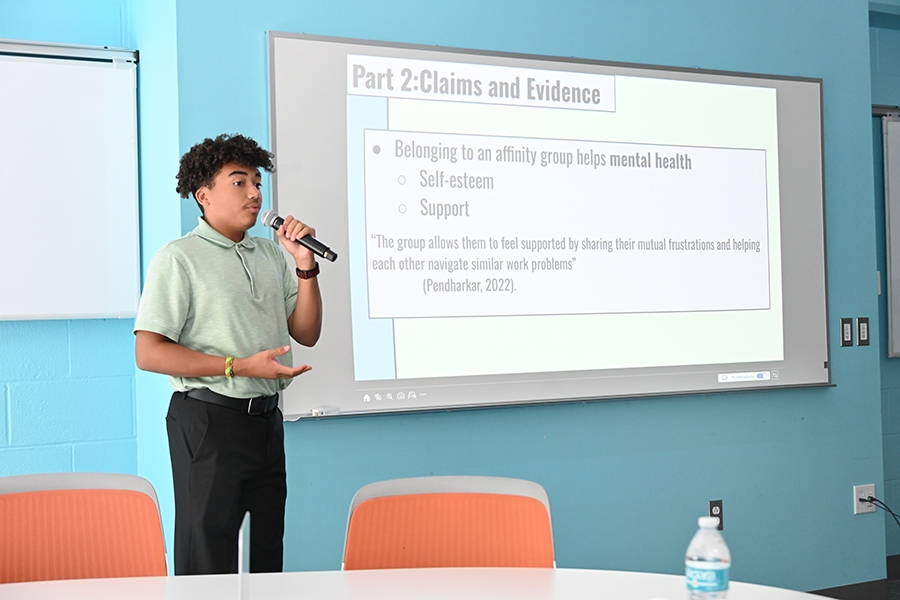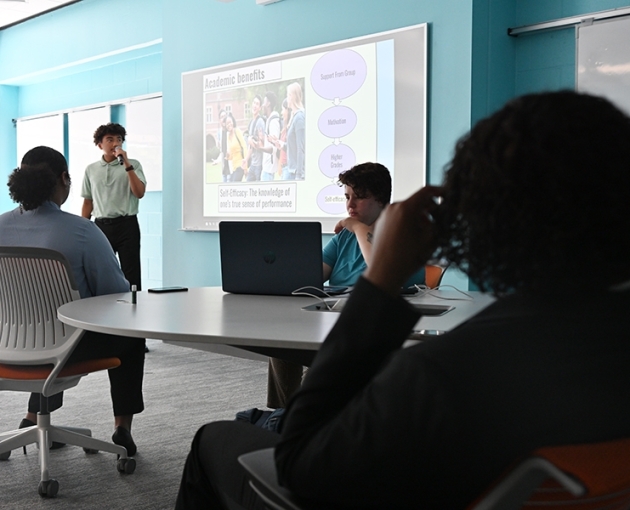SCOPE helps College of Education make education careers accessible to all
SCOPE helps College of Education make education careers accessible to all
By Brian D. Cox
UNIVERSITY PARK, Pa. — The Penn State College of Education’s mission is to change education by educating for change. Arguably nothing better encapsulates this mission than the Summer College Opportunity Program in Education, known as SCOPE.
Having welcomed its 22nd cohort this past summer in its 23rd year of existence (the program first welcomed students in 2002, but was not held in 2020 due to the COVID-19 pandemic), SCOPE invites approximately 20 students each year who have recently completed the 10th grade from underserved and/or minoritized backgrounds and have expressed an interest in an education career to come to campus for several weeks in the summer.
Those who successfully complete the program receive hard-earned college credit.
That’s because the days spent on campus are put to good use as part of a rigorous and challenging academic experience, explained Brenda Martinez, director of the College of Education’s Office of Education and Social Equity (OESE) and director of SCOPE.
“Students are pretty busy from about 8 a.m. to 5 p.m. each day,” Martinez said. “They have breaks in between classes but are doing a lot of learning throughout the day. They start their days with a learning to learn course, transition into their research and writing class, break for lunch, and move into college and career prep, and finally have a structured study hours time where they are getting individualized support on their research paper.”

Yaliset Villar, a SCOPE student from the Milton Hershey School, gives a presentation on first-generation college students and their mental health on July 26, 2024 in the Krause Innovation Studios in Chambers Building. (Photo: Brian D. Cox)
The students are able to choose their own education-related research topic. Throughout the four weeks, the first of which is virtual, followed by three weeks of on-campus instruction, students learn how to conduct their research, draw their conclusions and write what they have learned in order to present it.
The presentations are the culmination and finale of the four weeks. On the final day, projects are presented to a crowd of their SCOPE peers, family, friends, College of Education faculty and staff and anyone else who wishes to attend.
“Students definitely get to experience what it is like to be a college student and it mirrors the emotions of first-semester college students,” Martinez said. “There's the initial excitement of finding independence, getting to be on a college campus and meeting new friends. There's the midpoint where students are experiencing the intensity and stress of a final paper and presentation. And by the end of the program, they are so proud of the work that they've done and don’t want the experience to end.”
SCOPE projects have touched on such topics as how funding in The School District of Philadelphia disproportionally affects students of color, policing Black hair in K-12 schools and LGBTQ resources in the K-12 system. Some SCOPE students have even seen their work cited in doctoral dissertations, Martinez said.

Melany Molina Zervos, a SCOPE student from Liberty High School, gives a presentation on the mental health of Latinx students on July 26, 2024 in Krause Innovation Studios in Chambers Building. (Photo: Brian D. Cox)
SCOPE leadership both past and present consider the program an unqualified success, but getting to this point was a lot of hard and sometimes frustrating work, led by the now retired former Assistant Dean for Education and Social Equity and SCOPE founder María Schmidt.
Schmidt said she had first come up with the idea many years earlier, but that work began in earnest toward making the program a reality in the 2000-01 academic year. That was when she began developing a team that not only believed in the mission of SCOPE but helped take the concept and make it a reality.
“I had directed a summer bridge academic program under the Multicultural Resource Center where I used to work before moving to the College of Education,” Schmidt said. “I strongly believed there was a need to create summer bridge programs that would bring youth to education careers to try to address the critical need of diverse educators. I had to become very creative, look for donors, constantly be attentive of stretching every cent, dime, dollar, look for individuals with the necessary expertise in different areas of the program that could work without compensation and more.”
That mission is diversifying the pool of qualified teachers. According to the 2020 National Teacher and Principal Survey, as of 2017-18, 79% of public-school teachers were white and non-Hispanic. This meant that even in most of the schools where a majority of the students were non-white, a majority of teachers were white.
Additionally, for many students, the financial cost of obtaining a college degree and the certifications necessary to become a licensed teacher put doing so out of reach. SCOPE looks to create a pathway to college for students who statistically aren’t even a lock to graduate high school — not because they’re academically deficient, but simply because they don’t have the incentive to finish school.

Ava Lee, a SCOPE student from West Philadelphia High School, gives a presentation on the downsides of state standardized testing on July 26, 2024 in Krause Learning Space in Chambers Building. (Photo: Brian D. Cox)
One reason for this, Schmidt said, is due to students from varying cultural backgrounds rarely seeing teachers who share similar life experiences in whom they can see themselves and relate. This urgent need for qualified teachers to better represent the student body as a whole is just one of many reasons SCOPE is vital to the college’s mission, she said.
“We need to continue developing and supporting programs that create and sustain the pipeline from high school to education careers for the benefit of the teaching workforce and most importantly for all of the students’ academic success,” Schmidt said. “The lack of this type of opportunities for financially disadvantaged students of color is what ‘creates’ the need — usually these students don’t have the opportunity to go to summer camps, take college courses as non-degree students, participate in private programs that prepare kids for college and for standardized testing that will determine your future. The ‘need’ is created by the fact that underserved, minoritized, financially disadvantaged students are the highest percentage of high school dropouts, and the percentage keeps increasing.”
Not every student who comes through SCOPE decides to pursue a career in education. But just attending the program and getting individualized attention they may not receive at their home school and being able to experience what amounts to a condensed college semester is invaluable to these students.
“Some eventually decide that the realm of education is not for them,” Martinez said. “But at least they were able to have an experience that helped them define that for themselves. The main thing is ensuring that students are finding higher education accessible, feeling like it's a place for them. That they can belong there and also be equipped with the tools to be able to critically analyze an institution.”

Damian Wodarski, a SCOPE student from Upper Darby High School, gives a presentation on the positive impacts of affinity groups on July 26, 2024 in Krause Innovation Studios in Chambers Building. (Photo: Brian D. Cox)
However, not all of the benefits are realized by the participating “SCOPErs” as they’re commonly known.
Martinez said that graduate students in the College of Education serve as instructional support and even instructors in courses focused on learning to learn, research and writing, and college and career preparation.
That not only serves to pass on knowledge to the high school students, but the graduate students in the college gain valuable experience working with students from varying cultural and economic backgrounds.
“SCOPE provides our current students an opportunity to work hands-on with diverse learners,” Schmidt said. “The experience facilitates understanding of cultural and social class differences, stimulating openness to such differences and increased commitment to social justice. It helps our students become culturally sensitive and responsive as future teachers and counselors for the benefit of all learners.”
Schmidt may have been the most ardent supporter and defender of the program, and the catalyst for its inception, but she is the first to tell everyone she was hardly alone. Throughout its run, the program has experienced top-down support from two different deans, many past and present faculty and has benefitted from alumni philanthropy.
“It was the effort of our education community and many committed individuals that not only made it a reality, but have sustained it,” Schmidt said. “SCOPE is an example of what ‘it takes a village’ means.”
____________________________________________________________________________

